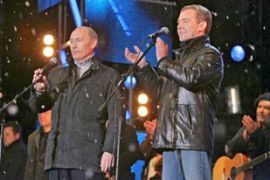Putin’s pick wins Russian election
Dmitry Medvedev promises “direct continuation” of predecessor’s policies.

On Sunday, Putin congratulated his protege.
“Our candidate, Dmitry Anatolyevich Medvedev, has taken a firm lead,” Putin said, wishing him success as he appeared alongside Medvedev on an open-air concert stage in Red Square, outside the Kremlin.
Many activists and ordinary Russians claim workers were pressed by bosses to vote and that some have been ordered to turn in absentee ballots, presumably so that someone else could vote in their stead.
The Organisation for Security and Co-operation in Europe (OSCE), refused to send observers, saying the Russian authorities were imposing such tight restrictions that they could not work in a meaningful way.
The Central Election Commission said turnout on Sunday was 67.7 per cent.
Political uncertainty
The new president will face some major domestic tasks.
Russia has got rich from skyrocketing world oil prices, but the economy is hugely dependent on natural resources and needs to diversify to solidify long-term prosperity.
Inflation – more than 11 per cent last year – is undermining the nascent middle class.
But with Medvedev’s victory, the main political uncertainty in Russia in the transition period is to what extent he will act independently of Putin.
The premiership that Putin is expected to take – Medvedev has said he would ask Putin to become his prime minister – is the most powerful executive position in the government and Putin would be likely to maximise its influence.
Speculation persists that the parliament, overwhelmingly dominated by Putin’s supporters, could expand the prime minister’s powers, or that Medvedev could resign before his term is out, allowing Putin to return to the presidency.
